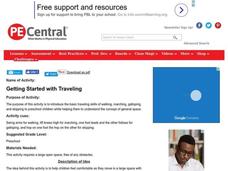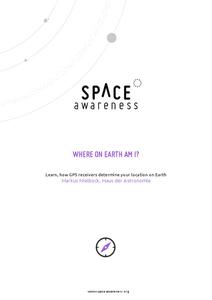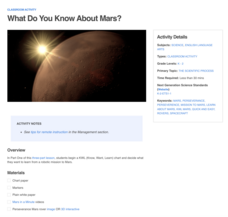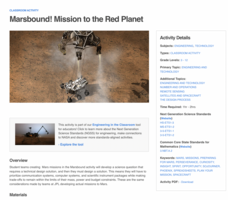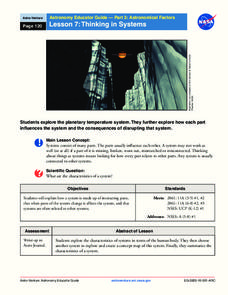Curated OER
Solar System: Uranus
Students research Uranus and its geological formation, atmosphere, magnetic field, satellites, and rings.
Curated OER
How Does Light Travel
Seventh graders design an experiment to determine how light travels. For this physics lesson, 7th graders collect and analyze data. They formulate a conclusion and share results with the class.
Curated OER
Time Travel, Black Holes, and Relativity
Students read the novel, The Time Machine, and compare H.G. Well's perceptions of the future with those presented in The Third Wave, by Alvin Toffler. They research current scientific and mathematical theories that relate to space and time.
Curated OER
Crossword- Travel Theme
In this crossword worksheet, learners read 9 clues and fit their answers in a crossword puzzle. Some of the clues have a theme of travel. There is no word box.
Curated OER
Visit Our Solar System
Students learn about the planets by creating a MediaBlender travel brochure. In this space science worksheet, students do research on a planet and create an interactive brochure for a visit to this planet. Students include facts about...
Curated OER
Getting Started with Traveling
Students are introduced to the basic traveling skills of walking, marching, galloping, and skipping while helping them to explain the concept of general space.
Curated OER
Recent Developments in Travel and Tourism
Students examine some of the recent developments in the travel and tourism industry. They research a specific area of the travel and tourism industry on the Internet. Each group presents their findings with the whole group.
Curated OER
Recent Developments in Travel and Tourism
High schoolers explain some of the main recent developments in the travel and tourism industry. They know how to access key information from the Internet and carry out some in-depth research into a specific area of the industry.
Curated OER
Historical Development of Travel and Tourism
Students know the key pre-requisites for travel and tourism development. They explain how the UK has developed its communications infrastructure, built mass transportation systems and increased leisure time.
Curated OER
Bon Voyage - Literature Travel Unit
Eighth graders locate and interpret information about the culture of another country using multi-media tools. Students read and interpret literature about characters and cultures from a foreign country. Students create a travel guide...
NASA
Resolving 3-Plane Traffic Conflicts by Changing Route—Problem Set C
Keep the planes from crashing. Pupils work with three airplanes and change their flight paths to keep them at a safe distance from each other. Individuals work through three problems in the third interactive in a set of six with...
Teach Engineering
The Great Gravity Escape
Groups simulate an orbit using a piece of string and a water balloon. Individuals spin in a circular path and calculate the balloon's velocity when the clothes pin can no longer hold onto the balloon.
DocsTeach
Challenger Explosion Photograph Analysis
Young historians turn into detectives in a thought-provoking activity on the Challenger Explosion. The activity uses an image of President Reagan watching the Challenger explode on live TV to help academics practice historical analysis....
DocsTeach
Analyzing a Photograph of Sally Ride
Sometimes, a picture really does say it all. The activity uses a picture of astronaut Sally Ride to help elementary academics make observations and form conclusions. Young historians study the picture, complete short written prompts, and...
Space Awareness
Where on Earth Am I?
Almost every phone has GPS installed, but a large number of teens don't know how the technology works. An initial activity illustrates how GPS determines a location on Earth. Scholars then apply trilateration procedures to a...
NASA
What Do You Know About Mars?
Learn exciting facts about Earth's neighboring planet—Mars! Young scientists collaborate on a KWL chart about Mars, adding information as the activity progresses. Scholars listen while teachers read an article about Mars and watch...
NASA
Exploring the Colors of Mars
Minerals on Mars are not that different than those on Earth. Using mineralogy concepts and satellite images, individuals use color to highlight the different surface minerals on Mars when creating a model of the planet. They enhance...
NASA
Marsbound! Mission to the Red Planet
Changing one aspect of a mission impacts all the others. Learners consider a list of criteria as they develop their own science questions related to Mars and design a solution while considering all the important systems: computer,...
NASA
Feel the Heat
Heat water up like a NASA engineer. Using the engineering design process, investigators create a system to trap and move heat through a water-filled tube. Designers participate in a post-activity discussion that highlights the role of...
NASA
Exploring Exoplanets with Kepler
Calculate the movement and properties of planets like professional astronomers! Scholars use Kepler's third law to find Mercury and Venus's distance from the sun. Using changes in brightness of distant stars and Kepler's third law,...
Teach Engineering
Edible Rovers
The good thing about building this rover is you get to eat it afterwards. Pairs determine rover parts they want to include in their design based upon their cost and usefulness. The teams design their rovers, build them from edible...
Teach Engineering
Edible Rovers (High School)
Design and build a rover ... then eat it? This activity has groups of two design and build Mars rovers. The teams determine what instruments they want to include with their rover and plan a budget. They calculate the cost of the body of...
NASA
Astronomy Mission Module
Yes, scientists say, there is other life in our solar system! And the best place to look is on Europa, a moon of Jupiter. Here, learners mimic the techniques scientists use to gather information about objects in our solar system, write...
Messenger Education
Exploring Solar Systems Across the Universe
Scientists have theorized that our solar system formed 4.6 billion years ago. In this pair of activities, learners first hypothesize how our solar system was formed. Using this information, groups then determine how scientists search for...
Other popular searches
- Pros Cons Space Exploration
- Space Travel Brochure
- Space Exploration Timeline
- Timeline of Space Travel
- Space Exploration Time Line
- Drama Space Travel
- 1950 Space Exploration
- Bill Nye Space Exploration
- History of Space Exploration
- Outer Space Travel
- Space Travel Reading
- History of Space Travel







